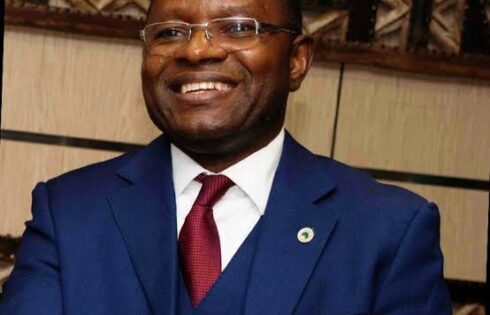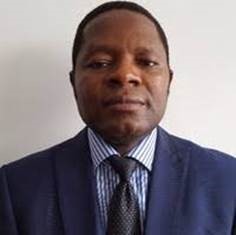Regular diagnosis, targeted policy actions for African economies critical.- AfDB Chief Economist
The African Development Bank Group’s Acting Chief Economist and Vice President for Economic Governance and Knowledge Management, Professor Kevin Chika Urama, shares his thoughts on the inaugural Africa’s Macroeconomic Performance and Outlook report, released last Thursday.
Excerpts
The new biannual publication aims to provide African policymakers, global investors, researchers, and other development partners with an incisive, timely, evidence-based evaluation of the continent’s recent macroeconomic performance and short-to-medium-term outlook amid dynamic global economic developments.
Why is Africa’s Macro-Economic Performance and Outlook report important?
Like other world regions, Africa continues to face overlapping shocks such as the COVID-19 pandemic, climate change-related impacts, rising geopolitical tensions, supply chain disruptions and the tightening global financial conditions impacting key macroeconomic indicators.
The macroeconomic indicators include economic growth, financial sector development, interest and exchange rates, fiscal positions, current account positions, financial flows and debt dynamics that are making policymaking and investment decisions very challenging.
The Africa’s Macroeconomic Performance and Outlook report covers all African countries and aims to provide regular analysis on the recent evolution and short to medium-term outlook of these key macroeconomic indicators at the continental, regional and country levels. It also proposes policies to aid policymaking and investment decisions on the continent.
The report will be released twice a year – in the first and third quarters – to provide policymakers, investors and all stakeholders with real-time and evidence-based information on the factors shaping Africa’s development.
 Prof. Kevin Chika Urama
Prof. Kevin Chika Urama
Why did the bank find it necessary to produce the report? What were the key objectives?
Africa’s Macroeconomic Performance and Outlook Report responds to a critical need for timely information to help decision-making in a context of heightened global and regional uncertainties.
Global macroeconomic conditions have recently become uncertain, with persistent multiple shocks that make policymaking and investment decisions challenging. With these global shocks and their interaction with prevailing pockets of domestic and regional risks, the need for regular diagnosis and targeted policy actions to address their impacts on African economies is critical.
With the publication of Africa’s Macroeconomic Performance and Outlook Report, The Bank –Africa’s premier knowledge broker — is reaffirming to African policymakers that it has a mandate to shape the African narrative on key issues of relevance to the continent’s development.
The report, therefore, serves as a compass for African countries on their economic situation, providing interested parties and stakeholders with an up-to-date evidence-based assessment of the continent’s recent macroeconomic performance and short-to-medium term outlook amid dynamic global economic developments.
2023 and 2024, higher than the projected global averages of 2.7 percent and 3.2 percent, respectively.
The stable outlook projected for 2023-2024 reflects continuing policy support in Africa, global efforts to mitigate the impact of external shocks and rising uncertainty in the global economy, the expected growth in demand for Africa’s commodities and green minerals as countries seek alternative sources of food and energy to counter the effects of Russia’s invasion of Ukraine, and green minerals to support global green transitions. globally.
Climate change could increase losses and damages due to extreme weather events and exacerbate fiscal risks for countries. The high dependence on exports of primary commodities with limited value addition exposes countries to commodity price volatility and could delay the structural transformation presented by the green transition.
With the low rates of COVID-19 vaccination across Africa, currently 26%, there is a moderate risk of new variants emerging, which could be amplified by a full reopening of the global economy.
We also have regional conflicts in key hotspots such as Burkina Faso, the Democratic Republic of Congo, Ethiopia, Mali, and Mozambique that could exert further pressures on the fiscal position of countries through increased security expenditure and reverse investment flows.
In addition, political risks could rise in 30 African countries. Algeria, the Democratic Republic of Congo, Egypt, Ethiopia, Libya, Madagascar, Nigeria, South Africa, and Zimbabwe are scheduled to hold national elections in 2023 or 2024
Managing foreign exchange reserves to reduce exchange-rate volatility and enhance export competitiveness could be part of effective risk-reducing agents.
Countries also need to implement local-content development and franchising policies to develop value chains and get more value from natural resources, especially in countries with minerals for green development.
African countries should boost regional trade to enhance resilience to spillovers from the global economic slowdown and reduce persistent trade deficits. Carrying out structural reform to boost regional trade can lead to a more vibrant regional market in the medium to long term.
 Prof Kevin Chika Urama
Prof Kevin Chika Urama
What would you say are the key takeaways from the report?
The report offers fundamental insights that African policymakers, global investors, researchers, and other development partners will find handy and utilize as an essential reference tool. It gives hope for continued economic resilience amid the heightened risk of global recession. Importantly, the economic growth was positive across all five African regions and that 53 of 54 African countries in 2022 with a stable outlook in the medium term against multiple shocks.
What would you say are the key takeaways from the report?
The report offers fundamental insights that African policymakers, global investors, researchers, and other development partners will find handy and utilize as an essential reference tool. It gives hope for continued economic resilience amid the heightened risk of global recession. Importantly, the economic growth was positive across all five African regions and that 53 of 54 African countries in 2022 with a stable outlook in the medium term against multiple shocks.
But the recovery and the economic resilience of African countries in the short-to-medium term come with cautious optimism given the considerable global uncertainty. Therefore, bold policy actions outlined above should be implemented to address the effects of rising inflation and sustain growth to a higher trajectory needed to reduce poverty. To meet the significant financing gaps in Africa, it is imperative to enact policies that can mobilize and leverage private financing for development in Africa

